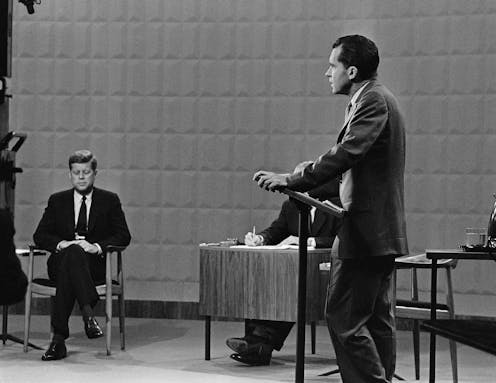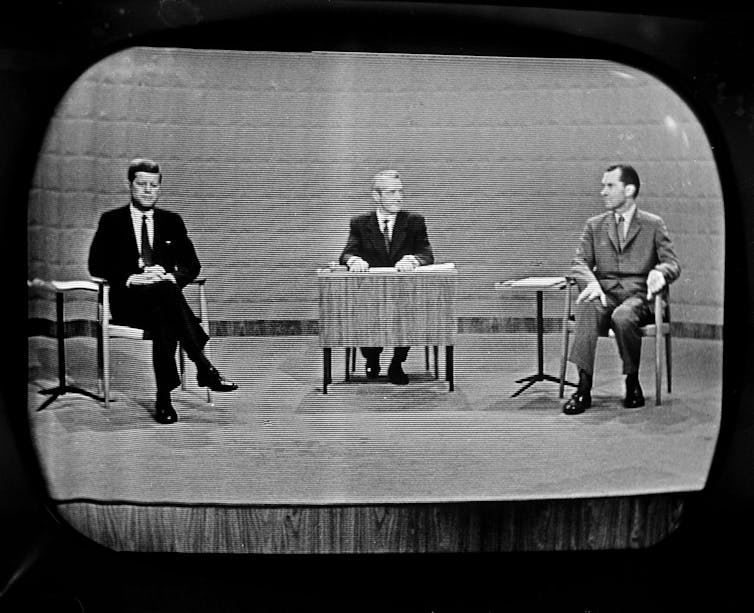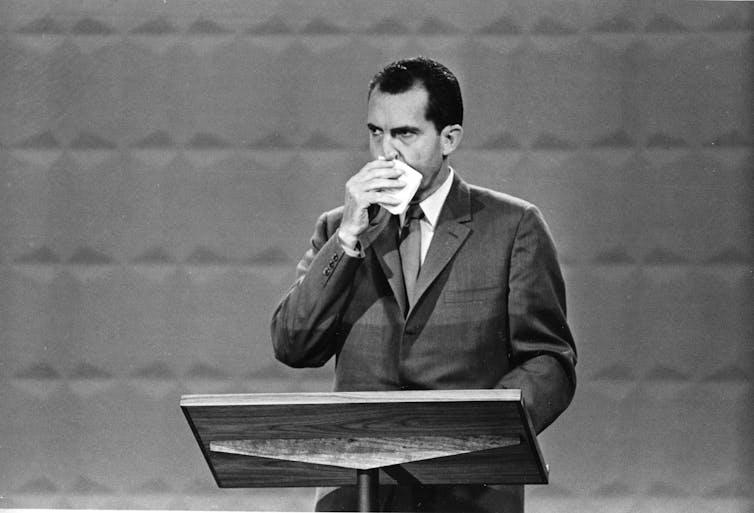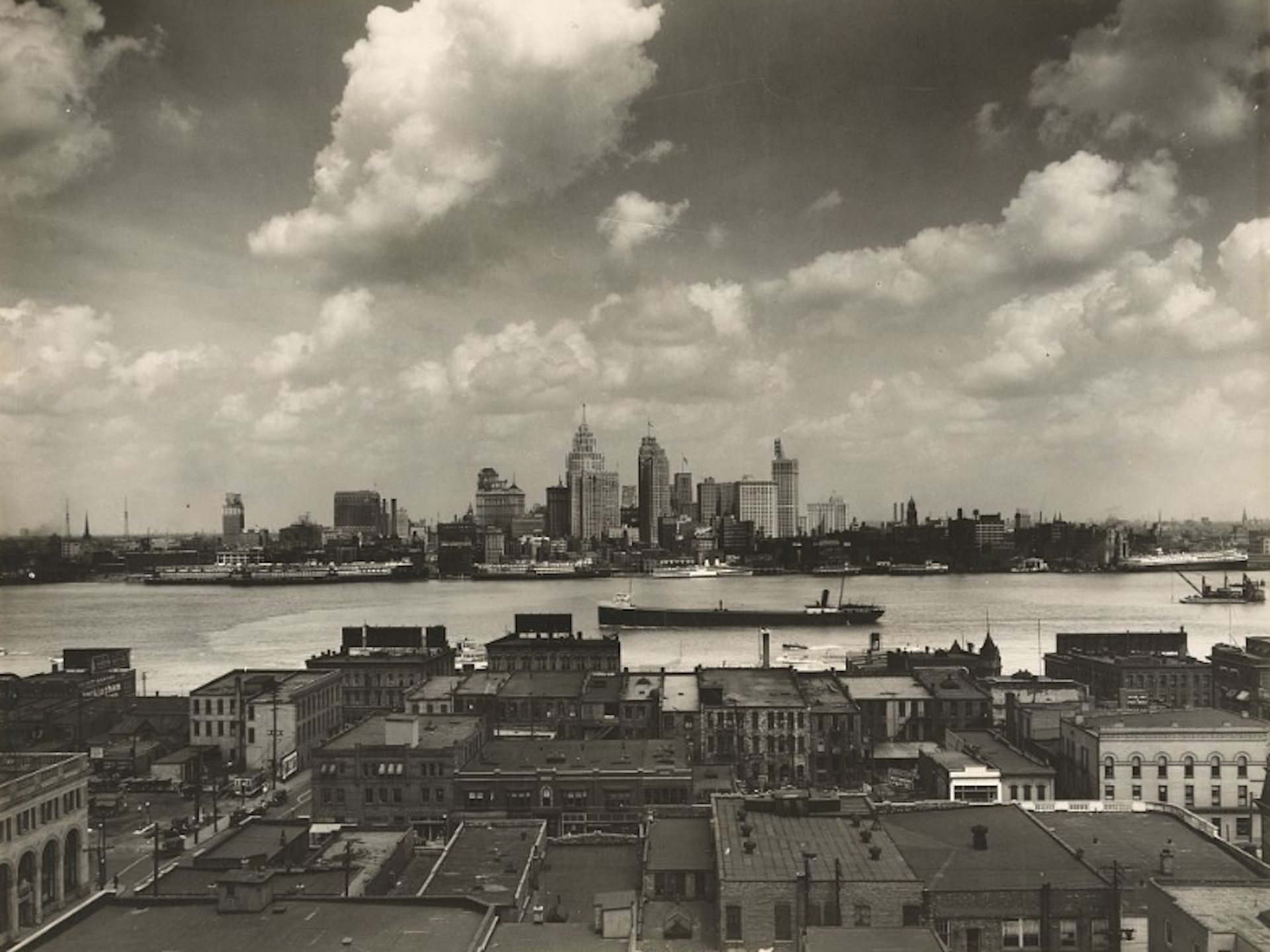What people say today about the first televised presidential debate, between Nixon and JFK, doesn’t
While people now reflect on how or whether Nixon’s sweaty, haggard appearance during the debate cost him the election, the view in 1960 was that the debate was a draw.

The run-up to the Joe Biden-Donald Trump debate at the end of June 2024 has brought reminders about the first-ever televised presidential debate – and how Vice President Richard Nixon’s sweaty, haggard appearance that autumn night in 1960 opened a pathway to the White House for the tanned and telegenic Sen. John F. Kennedy.
That, at least, is conventional wisdom about the Kennedy-Nixon debate of Sept. 26, 1960: Image prevailed, rewarding Kennedy and punishing Nixon.
“Kennedy went on to narrowly win the election that most say he never would have had a shot at without that first debate,” Time magazine declared in 2016, in recounting the greatest missteps in political debates. “It seems Nixon’s fatal flub was in failing to recognize the power of the visual image.”
Or as Max Frankel, then the executive editor of The New York Times, wrote sardonically several months after Nixon’s death in 1994, “Nixon lost a TV debate, and the Presidency, to John F. Kennedy in 1960 because of a sweaty upper lip.”
Nixon did perspire under the hot studio lights, but few pundits and analysts at the time focused their commentaries on the vice president’s appearance. In a revealing example of the impermanence of in-the-moment judgments, many pundits and analysts thought both candidates appeared nervous and tentative. Some of them said Nixon, who was still recovering from the effects of an infected knee that had sent him to Walter Reed Army Medical Center in late August 1960, had the better of the confrontation.
The prevailing view at the time was that the debate settled nothing about the 1960 race for the presidency.

The debate as a draw
What the public is often told nowadays about that first-of-its-kind debate, which took place without an audience in a television studio in Chicago, does not quite square with reactions and perceptions that circulated at the time. As the debate’s aftermath made clear, first assessments can be fleeting and prone to dramatic revision.
I examined scores of newspaper articles, editorials and commentaries written in the debate’s immediate aftermath in researching a chapter for “Getting It Wrong,” my 2017 book about media-driven myths. There was, I found, no unanimity among newspaper columnists and editorial writers about Nixon’s appearance. Not all of them thought Nixon’s performance was dreadful or that Kennedy was necessarily all that appealing.
The Washington Post, for example, declared in an editorial two days after the debate: “Of the two performances Mr. Nixon’s was probably the smoother. He is an accomplished debater with a professional polish, and he managed to convey a slightly patronizing air of a master instructing a pupil.”
The debate moderator, Howard K. Smith of ABC News, later was quoted as saying he thought “Nixon was marginally better” than Kennedy.
Saul Pett, a prominent feature writer for The Associated Press, rated Nixon highly for projecting cordiality. “On general folksiness, both before and during the debate,” Pett wrote in an article published the day after, “my scorecard showed Nixon easily ahead, at least 8 to 1. … He smiled more often and more broadly, especially at the start and close of a remark. Kennedy only allowed himself the luxury of a quarter-smile now and then.”
Walter Lippmann, a leading newspaper commentator of the time, mentioned Nixon’s manner deep in his column the day after the debate, saying television cameras “were very hard on Mr. Nixon. … They made him look sick, which he is not, and they made him look older and more worn than he is.”
The effect, Lippmann wrote, “was a misrepresentation and we must make sure for the future that the cameras are in fact impartial.”

Doubting TV’s powerful effects
But another syndicated columnist, William S. White, questioned the powerful effects of television in politics, writing, “There is, after all, no miraculous way to ride the electronic waves to the presidency: no gold mine of easily extracted votes in the TV sky.” Television was not new in 1960. About 87% of American households had at least one TV set by then. Still evolving, however, was television’s role in American politics.
Of greater importance, at least to some analysts, were Nixon’s tactics during the debate. He, for example, seemed inclined to discuss matters as framed by Kennedy. In his opening statement, Kennedy expressed dissatisfaction with the country’s direction amid the uncertainties of the Cold War, saying, “This is a great country, but I think it could be a greater country; and this is a powerful country, but I think it could be a more powerful country.” He wrapped up his opening remarks by stating: “I think it’s time America started moving again.”
Nixon, who spoke after Kennedy, disputed that the country had been “standing still” during the Eisenhower years, but said, nonetheless: “I subscribe completely to the spirit that Senator Kennedy has expressed tonight, the spirit that the United States should move ahead.”
He concluded his opening remarks by saying, “I know Senator Kennedy feels as deeply about these problems [facing the country] as I do, but our disagreement is not about the goals for America but only about the means to reach those goals.”
Whether Nixon was trying to curb his combative tendencies or appeal to wavering Democrats, his remarks came across as oddly defensive and deferential.
“Nixon insisted so strongly that he shared all Senator Kennedy’s worthy goals that one expected a Nixonian endorsement of the Democratic platform at any moment,” columnist Joseph Alsop wrote, sarcastically, a few days after the debate.
So what altered the consensus about the first debate from being a draw to being Nixon’s on-air ruin? The answer no doubt rests in the search for a post-election explanation for Kennedy’s victory. He won the popular vote by 0.2 percentage points, or about 118,000 votes.
Historians of the 1960 campaign have pointed out that any of a number of variables could have tipped the outcome in such a close race. But political journalist Theodore H. White, in his Pulitzer Prize-winning book “The Making of the President, 1960,” argued that televising the first debate had been crucial.
“Until the cameras opened on the senator and the vice-president,” White wrote in his book, which was published in 1961, “Kennedy had been the boy under assault and attack by the vice-president as immature, young, inexperienced. Now, obviously, in flesh and behavior, he was the vice-president’s equal.”
Whether television was so revealing and conclusive is arguable. Less debatable, however, is the sense today that television had made a difference. As historian David Greenberg has written about that first televised debate, “the perception of television’s influence went on to transform American politics, shaping the behavior of leaders and candidates for decades.”
To that observation one could easily add: The perception of television’s influence likewise transformed conventional wisdom about the first-ever presidential debate.
W. Joseph Campbell does not work for, consult, own shares in or receive funding from any company or organization that would benefit from this article, and has disclosed no relevant affiliations beyond their academic appointment.
Read These Next
AI’s growing appetite for power is putting Pennsylvania’s aging electricity grid to the test
As AI data centers are added to Pennsylvania’s existing infrastructure, they bring the promise of…
Why US third parties perform best in the Northeast
Many Americans are unhappy with the two major parties but seldom support alternatives. New England is…
Abortion laws show that public policy doesn’t always line up with public opinion
Polls indicate majority support for abortion rights in most states, but laws differ greatly between…






